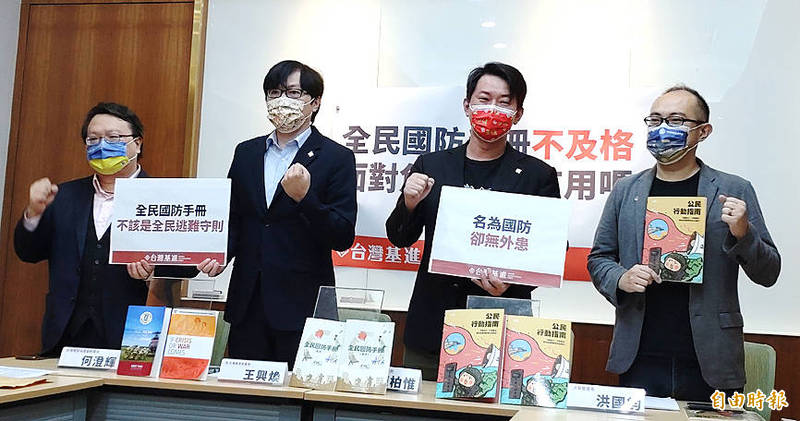《TAIPEI TIMES》 Defense handbook lacks call to ‘never surrender’

From left: Taiwan Association for Strategic Simulation deputy secretary Ho Cheng-hui, Taiwan Statebuilding Party secretary-general Wang Sing-huan, former Taiwan Statebuilding Party legislator Chen Po-wei and Watchout Co director Hung Kuo-chun hold a news conference yesterday to discuss a civil defense handbook published by the Ministry of National Defense. Photo: Yang Cheng-yu, Taipei Times
By Jason Pan / Staff reporter
The Taiwan Statebuilding Party yesterday criticized a new civil defense handbook, saying that it did not state that Taiwan would not surrender in case of an invasion.
Party Secretary-General Wang Sing-huan (王興煥) and the party’s sole former legislator, Chen Po-wei (陳柏惟), said that the handbook, released the day before by the All-out Defense Mobilization Agency, lacked practical information and is largely based on outdated concepts.
“Most importantly, it fails to stress that Taiwanese must unite to fight the enemy, and that our government and our armed forces will never surrender,” Wang said, adding that it should be revised for future editions.
It must make clear that news reports calling on Taiwanese to surrender are disinformation by the enemy, Wang said.
Taiwanese must learn that “we must help ourselves first, then others can help us,” Wang said, referring to Ukrainians defending their country from a Russian invasion.
The book lacks “a clear rationale why we must fight,” Wang said.
It also fails to address who the enemies of Taiwan are, he added.
As a legislator, Chen said he had asked the Ministry of National Defense to produce such a handbook, but after perusing the result, he felt like officials had treated the task as a “mere homework assignment.”
It does not provide readers with information why they should fight to defend the nation, he said.
The book lists many agencies and departments involved in defense, but does not explain their roles, Chen said.
It does not provide much information on the nation’s troops, so that civilians who have read the book might still be unable to distinguish a Taiwanese soldier from one of the enemy, Chen said.
Taiwan Association for Strategic Simulation deputy secretary Ho Cheng-hui (何澄輝) said that the book follows a top-down approach to national defense and does not provide the help needed to organize civilian defense at the local level, including “how to pool resources, how to set up and repair communication links, and ways in which civilians can support the nation’s armed forces.”
Many strategies explained in the book depend on communication via the Internet without taking into account likely disruptions, he said.
Future editions should contain lists of essential goods people should have at hand if war breaks out, he said.
新聞來源:TAIPEI TIMES














